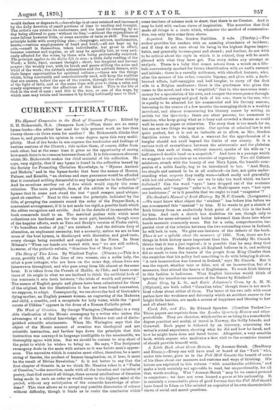CURRENT LITERATURE.
The Hymnal Companion to the Book of Common Prayer. Edited by E. H. Bickersteth, M.A. (Sampson Low.)—When there are so many hymn-books—the editor has used for this present work no less than twenty-three—is there room for another ? Mr. Bickersteth thinks that there is, and grounds his opinion in some degree upon this very multi- plicity. Most of the books in use express the tendencies and feelings of various sections of the Church ; this makes them, of course, differ from each other, but at the same time it gives us the opportunity of seeing how much there is in common between them all. It is this common element which Mr. Bickersteth makes the chief material of his collection. He says, very rightly, that if any hymn is found in the collection issued by the Society for Promoting Christian Knowledge, in "Hymns Ancient and Modern," and in the hymn-books that bear the names of Mercer, Palmer, and Kemble, "an obvious and sure guarantee would be afforded that it contained nothing distasteful to any large number in the Church." And he mentions another set of five which would supply the same criterion. The main principle, then, of the edition is the selection of hymns that in some sort stand the test "quod semper, quod ubique, quod ab omnibus." Next to this comes the principle, indicated by the title, of grouping the contents round the order of the Prayer-Book, a convenient arrangement, if it is not made too rigid, a possible fault which the editor recognizes and avoids. And in the details of its execution the book commends itself to us. The metrical psalms with which most collections are burdened are, for the most part, banished, though some of the happier efforts, such as Tate and Brady's version of Psalm cxlvii, "Ye boundless realms of joy," are retained. And the delicate duty of alteration, an unpleasant necessity, but a necessity, unless we are to lose some of the best hymns, is discharged with discretion and good taste, every change being recorded and explained in the Notes. In Dean Milman's "When our heads are bowed with woo" we are still robbed, however, of the pathetic refrain, "Gracious Son of Mary, hear."






























 Previous page
Previous page